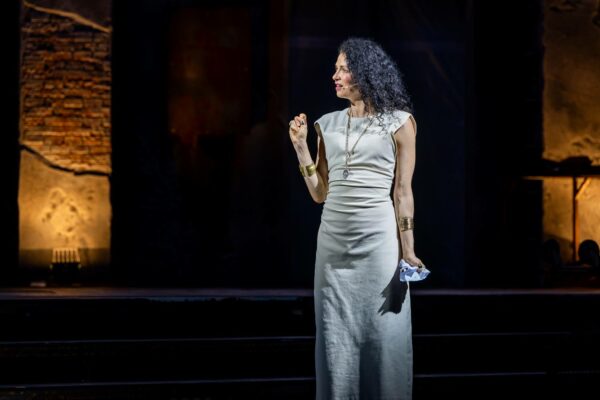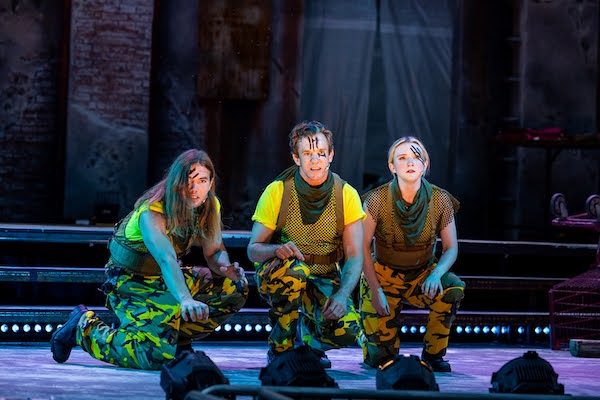Theater Review: “Macbeth” — Rousing Mayhem on the Boston Common
By Bill Marx
This version of Shakespeare’s tragedy comes off as an uncomplicated tale of murder under a starlit Boston sky that obligingly lights Macbeth’s “black and deep desires.”
Macbeth by William Shakespeare. Directed by Steven Maler. Staged by Commonwealth Shakespeare Company at the Parkman Bandstand, Boston Common, through August 6.

Faran Tahir as Macbeth in the Commonwealth Shakespeare Company production. Photo: Nile Scott Studios
One of my favorite essays on Macbeth is Mary McCarthy’s “General Macbeth,” which argues that the protagonist and his helpmate in homicide are nothing if not commonplace. These are two ordinary people who — baited the right way at the right time — conjoin to commit regicide. And they act while the monarch is asleep, which makes it even worse. Famously, Macbeth murders his and his own wife’s slumber after they commit the deed. And that is at the heart of McCarthy’s point. Shakespeare’s tragedy contains plenty of talk about the “dunnest smoke of hell,” but when you come down to it, Macbeth is not Iago or Richard III or Edmund. We watch him as he evolves, assisted by his fierce mate, from hail-and-well-met warrior to serial killer. Macbeth and wife are not psychopaths, emotionally dissociated from their death-dealing. They are human beings who, to make their move to the top, must suppress their humanity. The catch is that they don’t know when to stop. “Make thick my blood,” pleads Lady Macbeth, “Stop up th’ access and passage to remorse.” In Shakespeare’s brilliant cross-patterning, the initially resolute wife succumbs to maddening visions of guilt, while her once fearful husband grows ever more resolute in his monsterhood. Shakespeare’s warning is that something wicked this way comes … from out of ourselves if we lower our defenses.
I wanted to make this point because it underlines the strengths and weaknesses of Steven Maler’s Macbeth, an enjoyable enough evening of Bardic bedlam on the Boston Common. The staging moves along with a melodramatic energy that is rarely waylaid by nuance or ventures into provocative extremes. There are few attempts to create a conventional backdrop of doom and gloom — a few halfhearted spurts of fog, a sprinkling of “spooky” lighting effects, a soundscape filled with tiresome metallic banging and clanging. The set is a shell of a battle-battered building with a rusty jeep sitting out front; the costuming, aside from Lady Macbeth’s striking (and flamboyantly ironic) white outfit, is mostly army fatigues — even the Witches look as if they are serving a stint in the military. (A Supernatural Space Force?) Not much comes along that frightens or shocks — the script’s scenes of violence are soft and stylized. The most alarming moment, at least for me, arrives with the resounding slap Lady Macbeth lands on hubby’s face to keep him from raving about Banquo’s ghost. For that one moment, you are on her side: “Snap out of it!” The lack of atmospherics means that the production must focus on the script’s psychological complexity, on the various efforts to repress, or express, humanity, from the devolution of the Macbeths to the evolution of those changed with eliminating their evil — Malcolm, Macduff, etc.

Joanne Kelly as Lady Macbeth in the CSC production of Macbeth. Photo: Nile Scott Studios
The CSC staging takes a pretty straightforward hand to the Macbeths: they go about plotting and committing their bloody deeds with a pragmatic fervor. They never seem to be surprised by what comes out of their mouths, even though the script implies the pair is startled by where its upwardly mobile desires are driving it. (Who would have dreamed we could have pulled off a crime like this?) Faran Tahir’s Macbeth embraces toxic masculinity with ease, his early reluctance giving way — with insufficient gear-shifting — to full out gung-ho. Tahir brings a brusque vocal power and commanding muscularity to the role, but his delivery of the verse lacks off-speed spin, particularly flickers of vulnerability or intimations of nihilism. His rendition of “Tomorrow and Tomorrow and Tomorrow” is dutiful, bereft of mournful heft. Joanne Kelly’s Lady Macbeth is of the slinky, sensual variety; this is a woman who uses her sexuality to lure her man into doing the wrong thing. She isn’t particularly steely or all that ferocious. As for the latter approach, I must pay homage to the late Glenda Jackson, who played Lady Macbeth to Christopher Plummer’s Macbeth in a late ’80s production. When Jackson delivered the “unsex me here” speech, she grabbed her breasts and yanked at them as if she wanted to rip them off. For once, you could see what the Bard was up to in this difficult scene: the hysterical extremes to which this woman is willing to go, the sacrifices she is willing to make, to blow away Macbeth’s fears. It was spine-tingling. Kelly is more effective when she applies agile touches of tenderness in the “sleepwalking” episode.

The Witches (Jesse Hinson, John Blair, and Annika Burley) in the CSC staging of Macbeth. Photo: Nile Scott Studios
The supporting cast is steady but uncomplicated. There’s no suspicion Omar Robinson’s avuncular Banquo might be heading out with his son to consult with the Witches. Nael Nacer’s Macduff accepts his remorse with a ripe passion that empowers the man’s humanity as well as his desire for revenge. Marianna Bassham is an even-tempered Malcolm; John Kuntz’s vaudevillian ham of a Porter deserves — as he never stops wishing — to be remembered. His Doctor, though, should look a little more worried: the physician has seen what he shouldn’t in an authoritarian state. Maler’s most interesting idea is the suggestion, made via an opening tableau, that the Witches are somehow linked with (perhaps the ghosts of?) the men Macbeth has dispatched in battle. The figures take on various roles throughout the production (mostly the hired murderers), indicating that these demons are propelled by the victims’ thirst for vengeance. This point is absurdly brought home — with a two-ton clunk — in the production’s windup. The interpretation is intriguing, but it undercuts the anarchistic pizzazz — linguistic and otherwise — of the wild Witches. Do they really take sides? For the vanquished? It seems to me they might, in the future, have it in for the next Scottish ruler. On top of that, the conceit reinforces the notion that the self-destructive Macbeths are essentially fate’s marionettes, cogs in otherworldly wheels.
Still, the mayhem barrels proficiently along. This version of Shakespeare’s tragedy comes off as a rousing tale of murder under a starlit Boston sky that obligingly lights Macbeth’s “black and deep desires.”
Bill Marx is the editor-in-chief of the Arts Fuse. For four decades, he has written about arts and culture for print, broadcast, and online. He has regularly reviewed theater for National Public Radio Station WBUR and the Boston Globe. He created and edited WBUR Online Arts, a cultural webzine that in 2004 won an Online Journalism Award for Specialty Journalism. In 2007 he created the Arts Fuse, an online magazine dedicated to covering arts and culture in Boston and throughout New England.
Tagged: Commonwealth-Shakespeare-Company, Faran Tahir, Joanne Kelly, Macbeth

I think your review is much too negative …I count 13 or 14 critical complaints in a row from you without a pause to note even one effort by either the actors or the director that you judge to be worthy of compliment. And you have missed entirely a profound idea that our friend Mr. Shakespeare communicates in this play ……”What is done cannot be undone” . This is a wonderfully entertaining version of this thought provoking play.
Not convinced that your count of critical complaints is accurate. Are you counting Mary McCarthy’s ideas? As for what “what is done cannot be undone,” that could fit so many of the Bard’s plays. I was trying to explore what is distinctive to Macbeth.
Glad that you see that Shakespeare is still my friend.
I agree with Mr. Belkin above that what you set up as a mostly positive review turned out to be so negative again and again. This is not something I would often say, but is it possible that you were a little too hard on this production? I can see someone involved with it reading your review and getting more and more dispirited at yet another negative comment. And here is what I also wonder: isn’t the production you describe perfect for a very mainstream audience who would be there on the Boston Common, a production clear-headed and comprehensible and dramatic without major compromises?
Well, this is interesting. You don’t make any specific references to the production, so it might be that there are structural problems with the review. I didn’t mean to mislead.
The overall logic is clear to me: Macbeth calls for a production that digs into the play’s psychology. I don’t see that as positive about the production but as a matter of definition. This is my perspective on the play (there are manifold alternatives). I draw on McCarthy’s essay to make the point. When I get to the production I call it straightforward, “rousing,” but observe that it does not provide sufficient psychological nuance or provocative ideas. Those ingredients would be part of — for me — a superior production. I need to talk about what is missing in that regard, so I go into what is the questionable use of the Witches, etc. The problem may be with my first paragraph. I don’t see the opening as positive or negative. It is setting up the context. I am not convinced I was too hard on the production, but I may not have been clear enough.
As for your second question, I don’t think critics should evaluate productions (or movies or museum shows) with the aim of declaring whether they are “perfect” for a particular audience. What is a “very mainstream” audience? Your idea may be different from mine. This “targeted” approach can lead to condescension. I am offering up my judgment of what I saw, based on my taste, expertise, etc. I have attended over two dozen productions of Macbeth over the past four decades. That doesn’t make me any more ‘right’ than any other critic about the CSC production — but it is going to inform my conclusions.
Hello,
Interesting discussions. Regarding one of the core criticisms:
– In a long life of acting, theatergoing, studying Shakespeare I have never seen a production in which Macbeth and Lady Macbeth were so credible as a couple entangled in the same horrifying private and public drama—not Plumber and Jackson, not McKellen and Dench, nor any of the dozens of other pairs I can recall. Most of the play’s psychological subtlety is embedded in that relationship—and two actors, no matter how “polished” who exist in separate imaginative worlds, as Plumber and Jackson did, will never achieve the essence of what the play is about. Tahir and Kelly were exemplary in this respect.
– Due to budgetary constraints, this company had approximately two weeks of rehearsal (and a day or two of tech in the blazing sun) before first preview. That’s summer-stock timing. To expect a degree of refinement such as the Royal Shakespeare Company might achieve after five weeks of rehearsal, followed by weeks (or months) of previews, a long run in London and/or Stratford, and a world tour is not to recognize the accomplishment of this company and these actors who quite literally threw it all together and let it rip.
– I must observe that I am not alone in having found it coherent and exciting. The second half drove the action hurtling toward the bloody denouement and the famous “curse” (that supposedly accompanies productions of “The Scottish Play”) was nowhere to be found.
– This professional ensemble included many fine performances in addition to Tahir’s and Kelly’s. Your review gives short shift to them where it mentions them at all. I was skeptical of a female Malcolm, for example, but was quickly won over. The hugely challenging scene between Malcolm and Macduff was superbly played. Malcolm’s confession of evil fantasies and her sudden “conversion” to good were believable and moving. Similarly, Macduff’s overwhelmingly grief at the news of his wife and children’s murder and his determination to avenge them.
– The Witches worked beautifully as a kind of undead dance troupe and the trap door to the underworld created a theatrical hell—the “other place” in Hamlet—as well as a metaphysical one.
– Much more to say, but I will conclude by mentioning that the production made me think about Tyranny — the threat of tyranny that Timothy Snyder wrote about in the brilliant little volume, On Tyranny (2017). Tahir and Kelly’s passionate depictions, supported by a fine ensemble in a well-conceived physical production, tell the story of “vaulting ambition” and the horror it can unleash—a threatening reality we must guard against if we hope to avoid succumbing to tyranny ourselves.
Excellent comments here. A few responses.
I am not asking that the Macbeths be portrayed as a “credible couple” — only that we see their individual psychological struggles (which mirror each other in fascinating ways) explored on stage. That is one of the elements I found lacking in this production. Compulsive energy yes — that is what I mean by “rousing.” But those “separate imaginative worlds” that you refer to — those were missing. If I had to pick a production that got that element ‘right,’ it would be the late Anthony Sher/Harriet Walter RSC pairing. It eschewed the “sexy” Lady Macbeth convention. Walter was steely, and that seemed to give the actors the opportunity to move out of what has become a worn groove and explore more perverse areas. In a weird way, it seemed to bring the pair closer together — united in their determination to kill the “remorse” in themselves.
You mention that the production made you think of “tyranny” and vaulting ambition. According to his program notes, that is what the director had in mind and what (at least in part) makes the play relevant. That is a credible low-hanging fruit. My feeling, which I could only faintly suggest in the piece, is that the issue of “remorse” — the process of eradicating it — is particularly salient these days because dehumanization not only afflicts would-be tyrants but those who enable them. And this self-deadening takes place (is taking place) on both sides. The good and the bad tamp down the humanity in themselves by scapegoating each other and that aids the rise of tyranny. That is what the staging made me think about. I agree with you about the apt ferocity of Macduff’s reaction to his wife and children’s death. I should have underlined that more strongly.
I do not expect RSC refinement from the CSC. But I do respond to tackling the text in fresh and imaginative ways. Of course, judgments are personal, so we will have to agree to respectfully disagree in some cases. The Witches as an “undead dance troupe” did not work for me. I will stand by my argument that, by suggesting they were connected with the spirits of the dead soldiers, the staging ends up undercuts the play’s psychological dimension and heightens its determinism. That lets mankind off the hook, and Shakespeare is never about that.
About the Bard there is always more to say. Thanks for the reactions — that is what this magazine is about, serious discussion of the arts.
Thank you for response. Intelligent dialogue always welcome and interesting. Regrettably, I don’t have time for more, but I must mention that I didn’t read the program notes. The “Tyranny” fruit should be low-hanging, but too often isn’t, I’ve found. All best.
One more thing. In at least one way, the Macbeths must be “credible as a couple entangled in the same horrifying private and public drama.” Shakespeare makes it clear that the crime could not have been committed unless they worked together. Alone, neither would have been able to do the deed. (At least that is how it seems to me.) There is a strange symbiotic element in their relationship … they compliment each other.
Exactly so. And that’s precisely why I found Tahir and Kelly so compelling. Without that fateful interconnection (“If we should fail?/We fail.”) the roles often become a series of monologues strung together with scenes of a (bad) marriage.